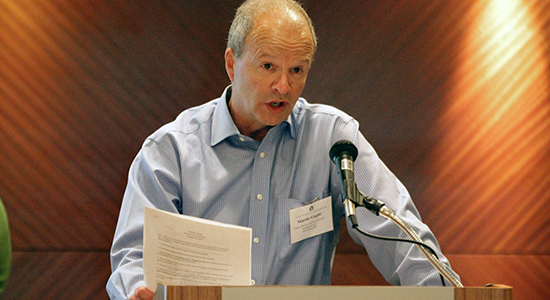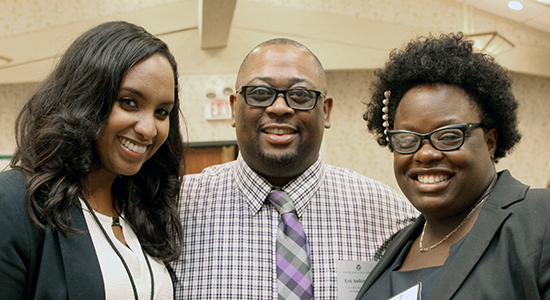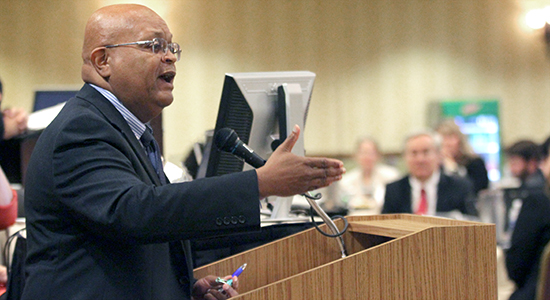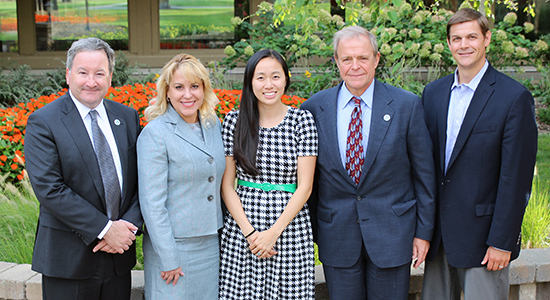Sept. 19, 2016 – In its first meeting of the fiscal year, the State Bar of Wisconsin’s Board of Governors voted to support a petition that would allow mediators to select, draft, modify, complete, and file documents on behalf of parties to the mediation.
The 52-member Board of Governors (board), which manages and directs the affairs and activities of the State Bar, convened at the Lake Lawn Resort in Delavan last Friday for the first of five meetings in fiscal year 2017.
And the governing body got to work quickly, unanimously supporting a mediator-related petition that the Director of State Courts plans to file on behalf of the Wisconsin Supreme Court’s Planning and Policy Advisory Committee (PPAC).
The petition will seek to create a third subsection to Wisconsin Supreme Court Rule 20:2.4, which relates to lawyers serving as third-party neutrals.
The current rule does not expressly allow mediators to select, draft, modify, complete, and file documents on behalf of parties to the mediation. The proposed rule would allow it if the mediator obtains informed consent from the parties. Mediators would still need to inform parties that they don’t represent either party to the action.
The State Bar’s Family Law Section and the Professional Ethics Committee support the petition. Martin Gagne, the Family Law Section’s liaison to the board and a family law practitioner, said many judges and court commissioners also favor it.
“Judges would really like this to happen because it reduces the number of completely pro se cases where they end up with a purported 15-minute stipulated divorce hearing and end up rewriting the stipulated divorce or the marital settlement agreement on the record in the courtroom and getting tied up for an hour or so,” he said.

Martin Gagne, Family Law Section liaison to the board, discusses the petition.
In a letter to the board, the Family Law Section said that “[d]rafting of stipulations and proposed orders, Marital Settlement Agreements, and Findings of Fact, Conclusions of Law and Judgments by lawyer mediators when neither party has an attorney can ensure that those documents are timely, properly, and precisely drafted.”
The PPAC petition is a follow-up to a 2013 petition, approved by the supreme court, that expressly allows attorneys to provide limited scope representation to clients.
Board Neutral on Witness Competency, Rules of Evidence Petitions
Rules of Evidence (16-02). The board took no position on a Wisconsin Judicial Council petition (16-02) that proposes to change Wisconsin’s Rules of Evidence and codify Wisconsin case law, correct deficient rules, and fill gaps. A motion to support the petition did not get enough votes.
The Wisconsin Judicial Council is a 21-member body that studies and makes recommendations relating to court pleading, practice, and procedure, as well as court organization, jurisdiction, and methods of administration and operation.
The petition would amend the following: Wis. Stat. section 901.07 (remainder of or related writings or recorded statements); Wis. Stat. section 906.08(2) (evidence of character and conduct of witness); and Wis. Stat. section 906.09 (impeachment by evidence of conviction of crime or adjudication of delinquency).
The petition would also create a Wis. Stat. section 906.16 (bias of witness), stating that “[f]or the purpose of attacking the credibility of a witness, evidence of bias, prejudice, or interest of the witness for or against any party to the case is admissible.”
Dist. 10 Gov. Charles Stertz, a member of the Judicial Council, gave the board a brief overview of the changes and the council’s rationale for the amendments. But several board members raised concerns that changes should be addressed in other ways.

At the meeting, from left: Makda Fessahaye, Eric Andrews, and Truscenialyn Brooks.
Dist. 13 Gov. Adam Gerol, Ozaukee County District Attorney, said he would support improvements to the rules of evidence by simply adopting the federal rules of evidence. “The proposals before us are more issues of policy,” he said.
“Anytime we codify something by statute, it does more than simply reflect that this is the jurisprudence of our state, it almost becomes instruction to the court that these are the things you must do in certain circumstances,” Gerol said. He suggested addressing these rules changes through more of a broad-based approach.
A public hearing on petition 16-02 is scheduled for Oct. 24, at 9:30 a.m.
Witness Competency (16-01). A motion to support another Judicial Council petition (16-01) to repeal “Deadman’s statutes” also failed to gain the board’s support. The board took no position.
Deadman’s statutes generally prohibit a witness from testifying about a transaction or communication with a person who later dies if the witness has a personal interest in the outcome of the case, or if a party derives a personal interest through that witness.
The Judicial Council filed the petition to the Wisconsin Supreme Court in April. A public hearing is set for Oct. 24, at 9:30 a.m., along with petition 16-02.
In a supporting memo to the petition, the Judicial Council notes that the proposed changes “are designed to improve the quality of legal practice in this state and reduce the number of errors and appeals, increasing court efficiency and effectiveness.”
The memo also notes that approximately 37 states have repealed, superceded, or never adopted a Deadman’s statute, reflecting a modern view that “the archaic rule supports injustice by preventing honest claimants from proving their case.”
But Dist. 9 Gov. Jeff Goldman, who does trust and estate litigation in three states that currently have Deadman’s statutes, said, “I don’t see it as the terrible evil that it’s characterized as in the petition.” He asked, “what’s the real benefit of getting rid of it?”
Stertz said the rule creates a lot of confusion and is not always used correctly. “What [the courts] are trying to keep out are better handled through other credibility and impeachment type evidence,” he said.
Treasurer John Danner suggested that more legal education about the Deadman’s statute and its application is the answer, not changing the rule.
Board Discusses Policy Position on Payee Notification
The board discussed (but took no action on) whether to take a policy position supporting notice to payee/clients when insurance settlements, distributed to the lawyer on the client’s behalf, exceed $5,000 or such other amount as deemed appropriate.
Payee notification rules are designed to protect clients/payees from a misappropriation of insurance settlement funds by a dishonest lawyer. At least 15 states have payee notification rules, implemented by statutes or administrative regulation.

Attorney Lindsey Draper, a member and former chair of the Wisconsin Lawyers’ Client Protection Fund Committee, informs the board about the petition for payee notification.
In payment of liability claims, “it is the customary practice of insurance carriers to deliver the settlement proceeds to the lawyer of record for the claimant,” according to the ABA’s Model Rule for Payee Notification - Preface. Thus, a lawyer may be less likely to attempt a misappropriation of funds if the client is notified of the details of the payment.
The board’s Policy Committee urged approval of the payee notification policy position at the request of the State Bar’s Wisconsin Lawyers’ Client Protection Fund Committee. The state Supreme Court created the Wisconsin Lawyers’ Client Protection Fund, funded by annual assessments paid by State Bar members, to reimburse clients who incur financial losses due to the dishonest conduct of their attorneys.
Attorney Lindsey Draper, a member and former chair of the Wisconsin Lawyers’ Client Protection Fund Committee, urged the board to support the policy position.
“It’s not just a matter of us reacting when there have been losses, but also to find ways to prevent the losses from happening,” said Draper, also the immediate past chair of the ABA’s Standing Committee on Client Protection. “One way is to let clients know when insurance companies have issued settlement checks to the lawyers.”
Draper said notification protects the clients. But it also protects Wisconsin lawyers, who are responsible for paying assessments to build the Client Protection Fund.
“We have had occurrences here in Wisconsin that have made it clear that if we had payee notification, [the fund] would be in a much stronger position,” he said.
Attorney David Werwie, a Nonresident Lawyers Division (NLRD) representative on the board, voiced his concerns with the policy. He said a notification rule could force insurance companies to incur costs that could be passed on to consumers.

NRLD members attending the Board of Governors meeting, from left: Jim Casey, Debra Kuper, Viet-Hanh Winchell, Charles Stahmer, and David Werwie.
“I appreciate that we want to protect the public from unscrupulous lawyers. But the unintended consequence could be higher insurance rates. I’m not sure that’s the purview of our group,” he said.
And he suggested that notification may not work. “I can’t remember the last time that I read anything from an insurance company that came in the mail or email unless I was shopping for insurance, particularly when it’s not my own insurance company.”
Dist. 9 Gov. Chris Rogers had “grave concerns” about allowing insurance companies to directly contact a person that is represented by counsel in an adversarial system. Rogers said that client-payees already sign releases to have the funds released.
“Payees are already on notice. To invade the purview of attorney-client privilege with a letter that I’m not convinced is going to make a difference gives me pause,” he said.
State Bar President Fran Deisinger agreed with some of Gov. Rogers’ concerns but said that protecting consumers and clients is a first order of business for the legal profession. “If we don’t recognize that, it may affect us in a very negative way.”
The proposal will likely be placed on the action agenda at a future meeting in FY 2017. Approval would allow the State Bar to seek legislative support.
Board Approves Deisinger’s Nomination Committee
The board approved State Bar President Fran Deisinger’s appointments to the five-member Nomination Committee for the State Bar’s April 2017 election cycle: State Bar President-elect Paul Swanson (chair, Oshkosh), Dist. 8 Gov. Deanne Koll (Menomonie), and attorneys Laura Skilton Verhoff (Madison), Thomas Schwaba (Marinette), and Steven DeVougas (Milwaukee). The committee nominates members to run for State Bar leadership positions.
Board Changes Locations for the 2019 and 2021 Annual Meeting and Conference
At the request of the State Bar’s Conference Planning Committee, the board changed the location of the State Bar of Wisconsin’s 2019 Annual Meeting and Conference (AMC) to the Hyatt on Main/KI Convention Center in Green Bay, considering the success of this year’s AMC at that location.
The 2019 AMC was previously scheduled to be held at the Wilderness Hotel & Golf Resort in Wisconsin Dells. Instead, the 2021 AMC will be held at the Wilderness.
Upon request, interested members may obtain a copy of the minutes of each meeting of the Board of Governors. For more information, contact State Bar Executive Coordinator Jan Marks by email or by phone at (608) 250-6106.
